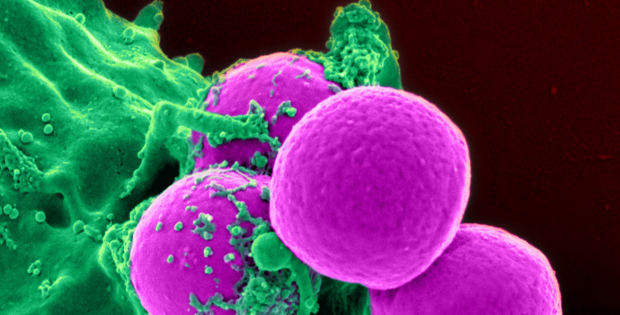Link Between Inflammation and Cancer

Inflammation is one of our immune system’s most powerful defensive weapons. The immune system is designed to eliminate “enemy” targets such as bacteria, injured cells, and chemical irritants. But inflammation is also a double-edged sword. We now know that there is a link between inflammation and cancer. Inflammation is a major factor in the growth of cancer tumors and their spread around the body.
Immune System: First Line of Defense
The skin is our body’s first line of defense. But, if this protective barrier is breached, then bacteria and other microbes can enter the body though the open wound. The white blood cells of the immune system are immediately sent to the site to attack these invading microbes. From the outside, we notice the signs of swelling, heat, redness, and pain.
Once the fight has ended, the white blood cells leave the area. The body then starts repairing the damage, creating new blood vessels to rapidly bring in “supplies”. A scab is also formed to protect the wound as the healing process proceeds.
But too much inflammation—persistent chronic inflammation—can actually start causing problems.
The Father of Modern Pathology
Rudolf Virchow (1821–1902) was a German physician, anthropologist, pathologist, prehistorian, biologist, writer, editor, and politician. He is known as “the father of modern pathology”. Virchow was the first to recognize a link between inflammation and cancer after finding immune cells in tumor samples.
Virchow was also the first to describe the origin of cancer cells from otherwise normal ordinary healthy cells. Virchow believed that cancer is caused by severe irritation in the tissues, known as the chronic irritation theory.
Chronic Inflammation and Cancer
His theory wasn’t taken seriously until the end of the 20th century when it was realized that specific cancers (including those of mesothelioma, lung, prostate, bladder, pancreatic, cervical, esophageal, melanoma, and head and neck) are indeed strongly associated with long-term inflammation.
Chronic inflammatory diseases such as pancreatitis and Crohn’s disease are also known increase a person’s risk of cancer. Cancers caused by infection with bacteria—such as stomach cancer with H. pylori—or viruses—such as liver cancer with hepatitis B or C—also have chronic inflammation in common as a defining characteristic.
DNA Mistakes & Sluggish DNA Repair
A US study was actually able to prove that chronic inflammation leads to pre-cancerous problems, DNA damage and, ultimately, bowel and stomach cancer. According to the study’s theory, inflammation causes gut cells to divide faster. These rapidly dividing cells can start accumulating DNA “mistakes” with each replication.
The study was conducted on genetically altered mice with a “sluggish” DNA repair mechanism. Our normal healthy cells contain proteins which continuously scan our DNA for problems which need to be repaired. This is an essential part of our natural defense against cancer cells.
Because of natural genetic variation, though, different people can have slightly different versions of these proteins which may work slower (or faster), or make more (or fewer) mistakes. For some people, their DNA repair mechanism doesn’t work as well, or as quickly as needed to keep up with rapidly dividing cells. For this reason, they may be more susceptible to getting cancer due to chronic inflammation.
The Link Between Inflammation and Cancer
Inflammation can add fuel to the fire of cancer cell growth and spread. A cancer tumor starts out as a few small cells that due to DNA errors are no longer functioning as normal healthy cells. These rogue cells ignore the normal commands that a healthy cell is limited by and start to grow and replicate unchecked.
As these cells grow bigger, their energy demands exceed their supply, and they start to accumulate DNA damage. This sends a signal to the immune system. But, it appears that these cancer cells are able to hijack the inflammation response for their own use. They lure in certain immune cells called macrophages and granulocytes. Once inside the cancer cells, these immune cells secrete molecules called cytokines that stimulate the growth of blood vessels (angiogenesis), which can then bring much-needed nutrients to the needy cancer cells.
Inflammation also producing chemicals that can help tumor cells eat away at their surrounding connective cells, freeing them to travel away from their starting point and metastasize in other locations throughout the body.
Old Dog, New Tricks
Science is still searching for the next generation of anti-inflammatory drugs to help control chronic inflammation in order to prevent certain cancers from taking root. But, the best idea is to try to prevent cancer from even happening in the first place.
It has been shown that long-term use of the anti-inflammatory drug aspirin (acetylsalicylic acid) actually reduces cancer risk. It not only block inflammation, but also simultaneously inhibits tumor formation and development. One study showed that, after three years of daily low-dose aspirin, the risk of developing cancer dropped significantly in both men and women.
But positive results were shown not only for preventing cancer, but also for cancer patients as well. Cancer patients taking aspirin every day appeared to have a reduced risk of their cancers spreading or metastasizing to other areas of the body.
Sources:
• Feeling the Heat – The Link Between Inflammation and Cancer
• Inflammation and Bowel Cancer
• Aspirin and Cancer: The Picture Becomes Clearer
• Rudolf Virchow on Wikipedia
Share This Article With Someone You Know
This article is copyright ©2019 Essense of Life, LLC. All rights reserved. Do not copy without permission.
This information is not medical advice and is certainly not intended to replace the advice or attention of your personal physician or other healthcare professional. Therefore, consult your doctor or healthcare professional before making any changes to your diet or starting a supplement program.
Cancer Survivor Stories: Alternative Cancer Treatments and Therapies




Facebook Comments